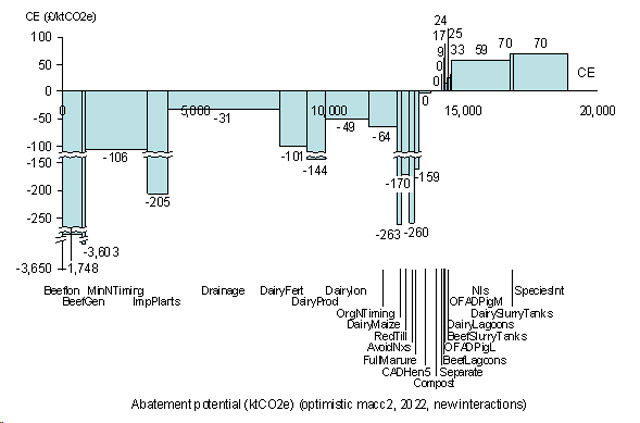A New Climate for UK agriculture
Published on 24 June 2011 in Climate, water and energy
Under the Climate Change Act (2008) the UK has adopted ambitious mitigation targets that have to be shared among the key economic sectors. Research by SRUC has led to the definition of clear greenhouse gas reduction targets for the agricultural sector in the UK and led to the first greenhouse gas budget developed for the sector. The results have been used by the UK Committee on Climate Change to inform sector carbon budget reports. They have also informed the aspirations set out by The Scottish Government in its report on Proposals and Policies (Low Carbon Scotland: Meeting the Emissions Reduction Targets 2010-2022).

Key Challenges
Greenhouse gas reduction in agriculture is more challenging than in other industries where the sources of emissions and methods to reduce them are more easily identified and managed. Farm systems are biophysically diverse and the cost of implementing effective measures can very across different farm types and locations.
- improved farm efficiency, including selective breeding of livestock optimised feeding strategies and use of nitrogen
- replacing fossil fuel emissions via alternative energy sources
- enhancing the removal of atmospheric CO2 via sequestration into soil and vegetation sinks
However, many measures are subject to uncertainty in terms of their effectiveness and/or their cost efficiency. The current range of estimates, however, is sufficiently robust for policy prioritisation. Through its research, SRUC has organised measures into a marginal abatement cost curve (MACC).
Key Benefits
SRUC’s research has identified approximately 10 million tonnes of Carbon dioxide equivalent, with a potential value of around £250 million, that could be mitigated from the sector by 2022 under ideal conditions. The work has been adopted by the UK Committee on Climate Change (CCC) in the setting of sectoral carbon budgets within the UK government and devolved administrations. It has also been used in developing of action plans to reduce carbon within the industries involved within the agricultural sector.
SRUC’s research has identified 10 million tonnes of carbon dioxide equivalent that could be mitigated from the agricultural sector by 2022, with a potential value of £250 million.
The work has also been instrumental in stimulating further research and development. To date, six projects have been commissioned by the CCC, Defra and the Scottish Government in order to follow-up the findings of the project. The findings have fed into at least another six projects commissioned since December 2008. The work has also attracted widespread international interest from other countries facing similar challenges and was presented as part of an international workshop in Dublin in 2009. The researchers involved have been invited to present the work to international organisations such as the European Union, the UN’s Food and Agriculture Organisation and the Organisation for Economic Co-operation and Development.
SRUC has maximised the impact of the research through a concerted knowledge exchange programme. This programme has deliberately gone beyond the academic audience and has targeted those responsible for developing policy and for land management. A particular feature of the work is that (as highlighted in Figure 1) it has been able to highlight to the industry that many of the measures to reduce carbon can also potentially improve the profitability of the farming enterprise. By focusing on these win-win situations, policy targets are more likely to be achieved.
Figure 1: A marginal abatement cost curve

Comments or Questions
Related Websites
Our Partners
The MACC has set an interesting research agenda with colleagues at the James Hutton Institute and the University Aberdeen.
Find Out More
For more information contact Dominic Moran, Dominic.Moran@sruc.ac.ukAuthor
Professor Dominic Moran Dominic.Moran@sruc.ac.uk







